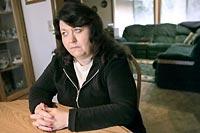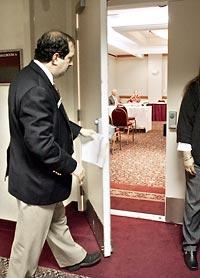|
|
|
|
|
|
Thursday, April 22, 2010 - Page updated at 04:17 PM Weak regulation fosters more abuseSeattle Times staff reporters
Lying on an examination table in a paper-thin gown, Lyubov Veselkov felt at ease with Dr. Huong T. Luu, even as he performed a pelvic exam. She never saw him slip a camera from his coat pocket. She didn't see the flash between her legs. But after a while, she asked, "Dr. Luu, it's taking a long time, what are you doing?" Then, Veselkov, 32, recalls, "He started to get nervous." The exam concluded and she cast the awkward moment aside. But an office assistant had spotted the camera flash and told Veselkov about it afterward. After she got over her shock, Veselkov notified the Washington Department of Health, in June 2001. Department investigators seized the computer from the Vancouver office of the family-practice doctor. They recovered 136 photos, most showing Luu touching women's genitalia, most with an ungloved hand. Health officials suspended Luu's license and set a disciplinary hearing. Veselkov drove 160 miles from her Clark County home to testify at Luu's hearing in Seattle that September. She sat in a lobby for an hour before a state official told her to go home — she was no longer needed. Then Luu's discipline disappeared behind closed doors. After secret negotiations with Luu, health regulators issued this punishment: no gynecological exams for three years; wear surgical gloves; always have a female chaperone in the exam room. Otherwise, it was business as usual. And since officials never sought the identities of the other women whose privacy had been violated, Luu's patients, most of whom were female, had no clue to his misconduct. Luu even was allowed to edit the state's disciplinary order. Removed: that he was touching Veselkov in the photograph and had tried to erase the digital photos. Added: his claim of innocence. Across the state of Washington, a Seattle Times investigation has found, health-care professionals have sexually abused hundreds of patients. As in other professions that are built on an imbalance of power and rely on trust — teaching, coaching, the clergy — some caregivers have violated that trust in ways that are shocking in their brazenness. But even more alarming is this: The state of Washington makes it easy for the abusers to get away with it again and again. A SEATTLE TIMES SPECIAL REPORT MISCONDUCT DATABASE Search a detailed database of health-care professionals charged with misconduct. THE STATE'S PROBLEM (Sun, 4/23)
LARGEST NUMBER OF OFFENDERS (Mon, 4/24) PREDATORS IN THE SYSTEM
GRAPHICS
RESOURCES State Health Department files, many opened for the first time after legal challenges by The Times, reveal women stalked to their homes, fragile teenagers groomed for sex, destitute patients forced to have sex in exchange for care. And many of the perpetrators are still seeing patients. In the past decade, The Times found, scores of Washington health-care practitioners — doctors, nurses, chiropractors and counselors — have retained their licenses after violating their oaths and their patients. Repeatedly, the state Department of Health has failed to adequately investigate and punish the offenders. Since 1995, the agency has dismissed 461 sexual-misconduct complaints — about a third of the nearly 1,500 received — without making so much as a single telephone inquiry. Even when the state does act, it often returns offenders to work under dubious safeguards, treating sexual abuse of patients as a lapse in judgment, like miscalculating a drug dose. Sometimes, these offenders victimize again. Among the deals the state has approved: • A Kirkland psychologist who had sex with female patients was told he could continue to treat women — but only those older than 50. • A Bellevue dentist, charged with molesting patients, was allowed back into practice — on the condition he install a video camera in his office so that regulators could randomly review the tapes for misconduct. • A Puyallup physician accused of fondling a woman's breasts was ordered only to attend a refresher class on how to conduct breast exams. Today, he stands accused of fondling other patients. • Dozens of offenders were required only to attend a medical-ethics class. Some had to write an essay about their conduct. State health officials defend such settlements as a quick way to discipline practitioners and still protect the public. But experts say such penalties are far too lax, and that officials should treat sexual misconduct as an indicator of deep-seated problems and a predictor of future offenses. In Washington, sexual misconduct is one of the leading disciplinary problems in health care. Although the state has never tallied such cases, The Times — using Department of Health files and court records — was able to identify 399 caregivers who have been disciplined for sexual misconduct offenses since 1995, most of them men exploiting women. About half of them have licenses to practice today. Overall, fewer than 1 percent of all health-care providers have been disciplined for sexual misconduct over the past decade. The numbers likely understate the problem. Only one of 20 patients who are sexually mistreated comes forward with a complaint, national studies show. "This is a big, big problem," said psychologist Scott Stacy, of Kansas-based Acumen Assessments, who has treated 600 practitioners accused of sexual transgressions. "It's much larger than most of us realize, and it's getting worse." The Health Department, which has never measured this problem, now says The Times' findings have prompted reform. Last month alone, the agency issued eight emergency suspensions for health-care professionals charged with sexual misconduct. In all of 2005, it issued only seven. Since Hippocrates Practitioner-patient sex ban is ancient but haphazardly enforced. Sexual contact by a medical practitioner with a patient has been forbidden since antiquity. After proclaiming, "First, do no harm," the Hippocratic Oath specifically prohibits physicians from having sex with patients. "Whatever houses I may visit, I will come for the benefit of the sick, remaining free of all intentional injustice, of all mischief and in particular of sexual relations with both female and male persons," the oath says. Modern-day professional associations for doctors, nurses, therapists and other practitioners make it clear: Sexual contact with a patient or client is unethical, and forbidden. Only a fraction of health-care providers commit such harm, but those inclined to do so have two important advantages over, say, accountants — access and power. "Doctors tell you to take off all your clothes, kneel on this table and bend over," said Dr. Steven Altchuler of the Mayo Clinic in Minnesota, one of the nation's leading authorities on the problem of sexual misconduct by doctors. "You do it without question. Why? Because we trust them like no other person." As a way to protect the public, the state Department of Health licenses 57 kinds of health-care practitioners. It also investigates complaints against them. The majority of those professions — typically, those requiring advanced training — also are regulated by governor-appointed boards and commissions. The Health Department and the 16 boards work together closely, and rarely disagree. The Health Department can object to a deal a board comes up with by filing a challenge in court. But that rarely happens. Instead, the department is a rubber stamp for a system that even regulators describe as understaffed and overtaxed. To understand why risky practitioners are allowed to return to work, one need only watch the system in action, as Times reporters did. The Medical Quality Assurance Commission, which regulates the state's 20,000 physicians, meets about seven times a year. At the disciplinary hearings, some regulators were clearly unfamiliar with the many cases before them. State health officials assemble thick investigative files, which are mailed to board members in advance, but regulators frequently do not read them until the hearing is under way, leaving scant time for meaningful examination. In case after case, regulators fumbled through files in search of unread documents. Most asked only cursory questions of the doctor facing charges, often none at all. Most of the board members squeeze this duty into full-time medical careers. They volunteer with hope of contributing to their profession by setting standards and policies but find that dealing out discipline consumes 90 percent of their board time. Some, such as Dr. Fredrick Dore of Silverdale, say it's become nearly impossible to run a practice while serving as prosecutor, jury and judge for the state board. "It's overwhelming," he said of the workload. A dangerous deal A chiropractor retains his license, despite his sex-crime conviction. In the past decade, state health officials and regulators have returned 197 practitioners to work, more than half under "practice restrictions" — treating only women over age 50, for example. State officials defend these arrangements as a practical necessity. They note that state courts consider a health-care license as the property of its holder, making it harder to take away, and that regulators must start with the "least restrictive" discipline, according to case law. As a result, deals such as Dr. Luu's are common. The state sometimes uses these deals even knowing that the offender has been convicted of a sexual felony. Take the case of chiropractor Keith Fair, convicted in 1997 of indecent liberties for fondling a male patient in his late 20s. Even while in prison for a year, he kept his license, although it was temporarily suspended. After release, he petitioned the state to reactivate his license so he could work again at his Chehalis-area clinic. Health Department manager Connie Glasgow gathered background about Fair and recommended to members of the Washington State Chiropractic Commission that they revoke his license. But in May 1999, commission members told Fair he could have it back after a 36-month suspension. Glasgow said she was stunned that Fair, a sex offender, would be allowed to keep his license. "I can't believe you're returning his license — he's a felon," she recalled telling board members. But once recommendations are made, state officials are prohibited from trying to sway commission decisions. Glasgow was reprimanded by higher-ups. Fair's license was reinstated in September 2003. However, regulators worried that he might offend again. Restrictions were ordered: He could treat male patients under the age of 30 only if a chaperone was in the room. And he had to submit to annual polygraph exams to see if he was following the age restriction. The commission's decision relied heavily on a psychiatric assessment that claimed Fair had not engaged in other improper sexual acts. But the assessment was wrong. Fair was charged in June 2004 with molesting a female relative years earlier who was 7 at the time of the assault. Despite new criminal charges, it took regulators nine more months to revoke Fair's license, which left him free to treat unsuspecting patients. Fair, now 69, pleaded guilty in late 2005 of a lesser charge of second-degree assault with sexual intent and is back in prison. Rep. Tom Campbell, R-Roy, vice chairman of the House Health Care Committee and a chiropractor himself, wants Washington to be tougher on practitioners who abuse their patients. "It's simply ludicrous," he said. "When you look at the punishment or the remedial actions taken, it's pathetic. I've been shocked by the repetitive nature of offenses by some providers, and they're still out there." Last year, he sponsored a bill that mandated revoking health-care licenses for repeat offenders. Lobbyists for the physicians' trade group said the discipline system was working adequately and opposed Campbell's bill, which failed. Question of consent Doctor accused of coercing patient to have sex. By the very nature of the relationship, patients are dependent on their caregivers and vulnerable to manipulation by them. That means they are unable to give meaningful consent to sexual contact. But in Washington, regulators have characterized nearly half of sexual misconduct cases as consensual. Often, that's code language for a case where sexual contact took place but the state is not revoking or suspending a license. This language often results from closed-door settlements in which practitioners or their lawyers reach a settlement with the state and agree to a written order that waters down the original statement of charges. These orders are what the public finds when it searches on the Department of Health Web site to check to see if a practitioner has been disciplined. Several women who filed sexual-misconduct complaints said the term "consensual" makes them furious because it brands them as willing participants. One woman scratched out "consensual" on a settlement and sent it to the state with an angry note: "This wasn't consensual! I was raped." "Consensual" is also how the state characterized Sandra Hatch's sexual contact with her osteopath. Hatch, a 44-year-old Alaska animal-control officer, injured her back at work and lived for years in chronic pain. In 1999, the state of Alaska sent her to Dr. Ronald Brockman, 64, an osteopathic physician from Seattle who worked part time in Alaska, evaluating state disability claims. Hatch was divorced, out of work, and hooked on pain pills. At her exam, Brockman told her she needed two expensive tests to confirm her back injury, records show. But the government did not pay for such tests, he told her. Weeks later, he told Hatch he could help her get her disability claim approved: He would fly her to Seattle, where he would pay for the tests himself. Hatch testified Brockman set one condition, however: She would have to have sex with him first. She later said she went along because "I had nobody else who could help prove my claim." While Brockman denies coercion, he admits having sex with his patient. "She was attractive," he said in an interview. "Why shouldn't I be allowed to have a relationship with someone whose case I reviewed?" Brockman continued to set sex-for-treatment conditions, Hatch claimed, and when she refused, he threatened her with violence. He denies it. Following that argument, Hatch telephoned state regulators and filed a complaint that said Brockman "held her disability claim hostage" and forced her into sex. After an investigation, the Washington State Board of Osteopathic Medicine and Surgery said Brockman "reflected no sense that he had engaged in misconduct." They criticized Brockman for supplying her with pain pills and placed him on probation for five years. But in their final report, regulators said the relationship was "consensual." Hatch's son, Ryan Keele, says his mother never bounced back from the ordeal, begging him, "Tell me I'm worthwhile." In September 2004, she died from an overdose of pain pills. "Red flare" Practitioners who escape discipline often reoffend. An act of sexual misconduct is almost never an innocent mistake, experts say. While a doctor's hands might slip during surgery, they don't accidentally fondle a patient's breasts. "Sexual misconduct is never an accident," said psychologist Stacy. "It has to be taken as a red flare, a warning sign of a significant problem." Left unchecked, there is a high probability offenders will do it again, he said. If they are checked — with intensive, long-term therapy, careful monitoring and appropriate practice restrictions — only one in 100 health-care offenders will offend again, according to several national studies of physician misconduct. In Washington, the rate of repeat offenders is 10 times higher. Here at least one out of 10 practitioners disciplined for sexual misconduct later exploited more patients or broke the terms of their practice restrictions, The Times has found. A recent case involves Dr. David M. Brown of Puyallup. In 1999, a woman reported that during a physical, Brown insisted on watching her undress, then made her bend over. She complained to Health Department investigators that he repeatedly squeezed her breasts, touched her groin, and commented that her flexibility made her a good sex partner. Brown countered that the woman had misunderstood his friendly banter. The regulators sided with the doctor. He was ordered to attend a remedial class on how to conduct breast exams and improve his communication skills. A psychiatric evaluation was deemed not necessary. In 2005, Brown came before the regulators again, accused of new offenses that mirrored the previous one. The charges from three women allege that Brown had fondled them and made sexually inappropriate comments during exams. In one case, a patient complained, he stroked her hair, told her she was beautiful, and used both hands to grab her breasts. In another, a patient alleges that Brown suggested she give him oral sex. The case is still pending, to be decided later this year. But this time, the state has temporarily suspended Brown's license. For her part, Washington Department of Health Secretary Mary Selecky is launching unprecedented reforms to investigate sexual-misconduct complaints more thoroughly and, when warranted, suspend licenses more rapidly. "The Times research shows that clearly we could do a better job, and we are," she said. "Sexual misconduct cases are now our top priority." Michael J. Berens: 206-464-2288 or mberens@seattletimes.com Staff reporter Carol M. Ostrom and researchers David Turim and Gene Balk contributed to this series. Copyright © 2006 The Seattle Times Company Most read articles
|
Seattle Times Special
Miracle Machines: The 21st-Century Snake Oil
The Favor Factory
Confronting Malaria
Pike Place Market
Your Courts, Their Secrets
License to Harm
The Bering Sea
Olympic Sculpture Park |












